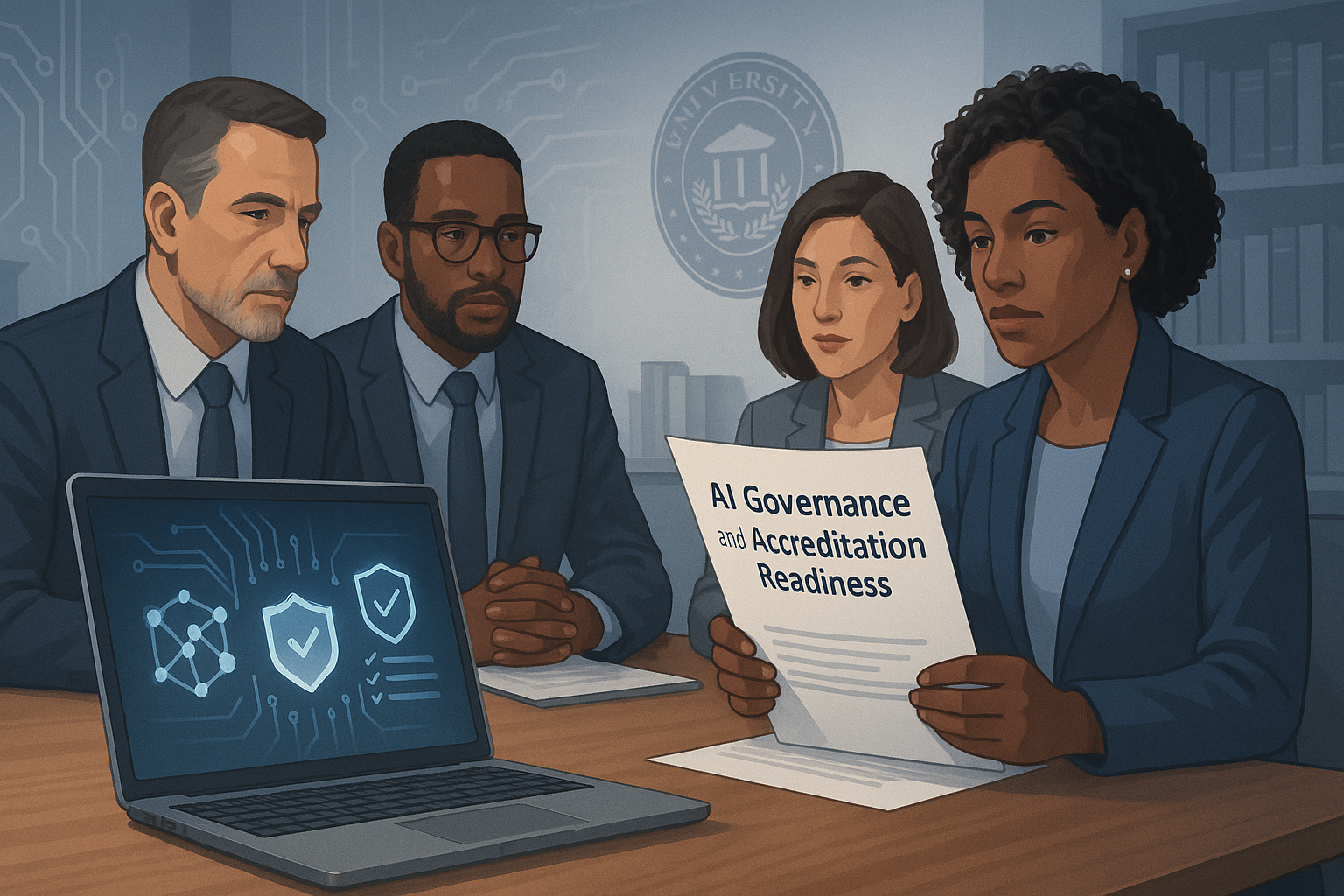The AI conversation in higher education has shifted from what’s possible to what’s provable. Institutions are no longer praised for experimentation—they’re being measured by how well they govern it. This week’s strongest studies and policy reports show universities confronting a new reality: AI literacy, governance, and transparency have become markers of institutional credibility. Accreditation bodies, researchers, and faculty are all converging on one message—responsible use is now the standard of excellence.

Accreditation Reinvented for the AI Era
Summary
A quiet revolution is reshaping accreditation as AI governance becomes part of quality assurance. Singleton (2025) finds accrediting bodies are shifting the conversation from innovation to institutional integrity, asking how institutions validate responsible use, demonstrate transparency, and assign oversight (Singleton, 2025).
The Details
- Accreditation reviews increasingly request documented AI use across teaching, research, and operations.
- Self-studies are expected to demonstrate transparency, accessibility, and inclusion in AI-supported practices.
- Governance structures and faculty training artifacts are treated as indicators of institutional readiness.
- Programs are asked to demonstrate the auditability of AI-supported assessment and decision processes.
Why It Matters
Accreditation has always centered on evidence; AI is no exception. Renewal decisions may soon hinge as much on responsible AI stewardship and data ethics as on academic outcomes, raising the bar for policy design, training, and transparent practice.
Student Voices Drive AI Governance
Summary
Governance reform isn’t confined to boardrooms; learners are helping design it. Barus (2025) shows how student input is shaping policies for fairness, consent, and educational purpose, turning governance into a shared, human-centered process (Barus, 2025).
The Details
- Participatory design brings student experience directly into policy development.
- Institutions align pedagogy and assessment practices with ethical standards for AI use.
- Feedback loops clarify expectations and strengthen trust in classrooms and labs.
- Co-created guidelines reduce misuse and improve transparency in course contexts.
Why It Matters
Policies built with learners—rather than for them—travel further. Student co-design grounds AI governance in real learning contexts, increasing legitimacy and ensuring that tools support, not substitute for, high-quality teaching and assessment.
Policy & Governance
-
Redefining University Systems for Responsible AI
The Higher Education Policy Institute’s report Right Here, Right Now urges universities to modernize assessment and faculty roles to keep human judgment at the center of AI adoption, warning that outdated governance and slow policy cycles threaten credibility more than technology itself (Higher Education Policy Institute, 2025).
-
Institutional Guidelines for Generative AI
An et al. (2025) reviewed global university AI policies. They found that institutions with clearly defined governance frameworks—spanning ethics, privacy, and academic conduct—report stronger faculty confidence and fewer incidents of misuse, concluding that precision in policy is the true driver of readiness (An et al., 2025).
Programs, Research & Infrastructure
-
Balancing Innovation and Dependence
AI can enhance creativity—but it can also erode confidence. Alhur (2025) found that educators who over-rely on generative tools risk weakening professional autonomy and decision-making, calling for structured faculty development that teaches critical use and safeguards human judgment (Alhur, 2025).
-
Designing a Higher-Education AI Framework
Temper (2025) introduces the proposed Higher Education Act for AI (HEAT-AI), a model inspired by the EU’s AI Act but tailored for academia, recommending risk-based classification and mandatory faculty training to ensure responsible integration (Temper, 2025).
Do It Now Checklist
Betting on Institutional Integrity
Higher education’s credibility no longer hinges on whether it uses AI—but on how responsibly it does. The leaders who tie innovation to ethics and compliance to culture will define the next generation of academic excellence.
With Inspiration Moments, we share motivational nuggets to empower you to make meaningful choices for a more fulfilling future. This week, institutional integrity reminds us that trust is earned through action, not aspiration. Stay mindful, stay focused, and remember that every great change starts with a single step. So, keep thriving, understanding that “Life happens for you, not to you, to live your purpose.” Until next time.
Respectfully,
Lynn “Coach” Austin
References
All sources are hyperlinked in-text for immediate access to original publications.
🎧 Listen to the Podcast

